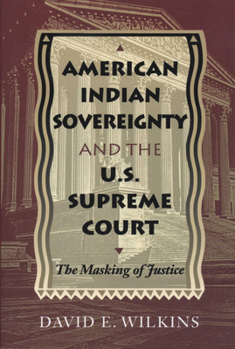American Indian Sovereignty and the U.S. Supreme Court: The Masking of Justice
Select Format
Select Condition 
Book Overview
"Like the miner's canary, the Indian marks the shift from fresh air to poison gas in our political atmosphere; and our treatment of Indians, even more than our treatment of other minorities, reflects the rise and fall in our democratic faith," wrote Felix S. Cohen, an early expert in Indian legal affairs. In this book, David Wilkins charts the "fall in our democratic faith" through fifteen landmark cases in which the Supreme Court significantly...
Format:Paperback
Language:English
ISBN:0292791097
ISBN13:9780292791091
Release Date:November 1997
Publisher:University of Texas Press
Length:421 Pages
Weight:1.25 lbs.
Dimensions:1.0" x 6.0" x 9.0"
Customer Reviews
1 rating
The facts themselves are a profound indictment of "law"
Published by Thriftbooks.com User , 15 years ago
American Indian law represents an extraordinarily incoherent set of decisions and principles, with results that are not only bad public policy but indefensible in any terms that I know. To take only one example, the jurisdiction of a police force depends not only on whether a crime occurred on white-owned or tribally-owned land inside a reservation but on whether the criminal and the victim are Indians or not. All of this also varies by the nature of the crime. When you consider that some criminals, such as poachers, move from land parcel to land parcel without it being obvious where the actual crime occurs, and that the identity of the criminal is generally unknown at the start of an investigation, you have a recipe for non-Indians to get away with many crimes against Indians through legal maneuvering. The "sovereignty" of each Nation is similarly confused, especially with respect to the state in which each reservation finds itself. Why is Indian law so confused? In this book, David Wilkins attributes it to a "legal consciousness" held by jurists and others. He divides this into three themes: constitution/treaty, civilizing/paternalistic, and nationalism/federalism. To read these cases is to shake one's head and wonder, "What on earth were they thinking?" Much of Indian law rests on claims that have no foundation in law, starting with the notion that the tribes are "domestic-dependent nations." Racism, paternalism, ignorance, and a mind-boggling belief that Congress reigns supreme over people who have never acknowledged its supremacy run through these pages. Thus, we have treaties with tribes that take legal effect even if Congress doesn't ratify them, and that Congress can violate, reinterpret, or denounce but the tribes cannot. Native Alaskans were even subject to US law without treaties at all. Though eventually incorporated into the political system, Indians were not given the same legal rights as others. They do not have redress against their governments. The Supreme Court refuses to protect their rights against the federal government. If you're not an Indian, this matters to you - - if the Court will not uphold the constitution or the law to protect Indians, why do you think it will protect you either? Indian law is incoherent. It's indefensible. We need to start over. Read this book and learn why.





